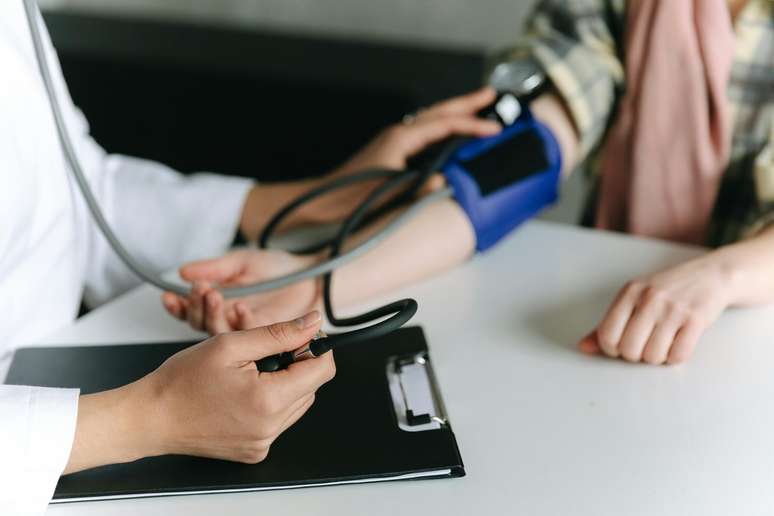The study showed that 5 hours of moderate exercise a week is enough to reduce the risk of developing cancer
World Physical Activity Day is celebrated on 6 April, a date established by the World Health Organization (WHO). The goal is to fight a sedentary lifestyle and make the population aware of its risks. According to the Ministry of Health, about 47% of adult Brazilians do not practice the levels of physical activity recommended by the WHO. This bad habit is directly associated with an increased risk of developing cancer.
html[data-range=”xlarge”] figure image img.img-7f222486b97cb895d8e4e27bc34f8ef45ka56l0j { width: 774px; height: 463px; }HTML[data-range=”large”] figure image img.img-7f222486b97cb895d8e4e27bc34f8ef45ka56l0j { width: 548px; height: 328px; }HTML[data-range=”small”] image figure img.img-7f222486b97cb895d8e4e27bc34f8ef45ka56l0j, html[data-range=”medium”] figure image img.img-7f222486b97cb895d8e4e27bc34f8ef45ka56l0j { width: 564px; height: 337px; }
The scientific journal Cadernos de Saúde Pública indicates that 72.5% of people diagnosed with cancer in Brazil reported having a sedentary lifestyle. This data is even more evident in the subdivision by gender and age. This is because the cancers are more frequent in women between 40 and 59 years and in men after 60 years.
Pandemic and bad health habits
For the oncologist Dr. Carlos Gil Ferreira, medical director of the Oncoclínicas Group and president of the Oncoclínicas Institute, it is possible to observe a scenario of constant increase in the number of oncological diseases. According to him, the situation has worsened in the short term due to the effects of the pandemic on the lifestyle of the population.
“Previous analyzes already indicate that social isolation has caused a deterioration in the quality of life of Brazilians. This happened especially in the months of the most acute phases of the restrictions. Among the reports, the more frequent consumption of alcoholic and processed drinks and ultra- processed foods, added to the difficulty in carrying out physical activities, have caused changes in the health of Brazilians and we will have to face challenges to reverse the damage caused”, underlines the specialist.
He recalls that, previously, warning campaigns about the harmful effects of cigarette consumption led to an effective reduction in smoking in the country. For the doctor, this fact can be considered one of the greatest achievements of oncology in the last 20 years. Of course, in addition to the progress in the development of new drugs. But the work is far from finished.
“Now is the time to redouble our efforts to maximize the dissemination of care information when it comes to a sedentary lifestyle and eating habits. Especially in the face of the additional challenges that have arisen as a result of the pandemic,” Carlos reinforces.
More and more cancer cases
In Brazil, according to the National Cancer Institute (Inca), 625,000 new cases are diagnosed each year. The disease occurs in part due to increased life expectancy. However, there is a considerable volume of diagnoses related to preventable risk factors.
“Lack of physical activity and unbalanced diets, with low fiber intake and excess fat, may be related to 50% of cases of endometrial cancer, 37% of cancer of the oesophagus, 25% of malignant tumors of the colon and 20% of breast cancers Just to name a few estimates brought from studies carried out inside and outside the country,” says the oncologist.
Globally, the scenario is no different. The WHO-linked International Agency for Research on Cancer (IARC) reports that the total number of new cancer cases has nearly doubled in the past two decades. That is, it went from an estimated 10 million in 2000 to 19.3 million in 2020.
The projections of the Globocan 2020 report also indicate that cancer detection rates tend to increase in the coming years. Levels are estimated to reach almost 50% higher in 2040 than in the current scenario, when the world is then expected to record something around 28.4 million new cancer cases.
The number of cancer deaths, in turn, rose from 6.2 million in 2000 to 10 million in 2020. This equation shows that for every six deaths worldwide, one occurs from cancer.
Physical activity is an ally of prevention
Several recent scientific studies reinforce the importance of adopting healthy habits to stop the advance of cancer cases in Brazil and around the world. One of them, published in January 2022 in the “Revista da Sociedade Brasileira de Medicina Tropical”, underlines that from 1999 to 2019 the increase in the sedentary lifestyle and in the obesity rate among the population, largely due to the growing consumption of ultra-processed foods and alcohol intake (which increased by 41%) contributed to the increase in cancer risk factors.
Carlos also adds that exercise has an impact on a lower risk of developing cancer. “When we are physically active, studies show that it is possible to reduce the risks of at least 13 types of cancer. An example is rectum, bladder, breast, blood, among others,” he points out.
The change resulting from simple lifestyle adjustments is indeed effective, as demonstrated by an analysis published in October 2021 in Medicine & Science in Sports & Exercise. Research, conducted in the United States, indicates this brisk walking for 45 minutes a day, a total of five hours of moderate exercise a week, can effectively reduce the risk of cancer. Additionally, exercise has a positive impact on the quality of life of the general population by preventing a number of other diseases.
And these are just some of the practical examples that reinforce the importance of fighting a sedentary lifestyle, points out the oncologist. For those seeking to reduce their risk of cancer, doctors recommend a gradual change in routine, with adjustments as necessary.
“It’s important to find activities that you really enjoy and start with lighter, more moderate exercise, which can increase in intensity over time. Even simple everyday activities, like climbing stairs, walking the dog, or walking the kids to school are ways to bring movement to the body. In addition to an exercise routine, it is very important that the general population adopts a balanced diet, rich in fruits, vegetables, proteins and greens and always keep hydration up to date, “guide .
Cancer patients also benefit from exercise
For those who have already received a cancer diagnosis, the practice of physical exercise can also bring several benefits. “This is because they increase the activity of certain cells of the immune system, which can target cancer cells,” explains Dr. Carlo.
“In the case of sedentary people, in addition to cancer, it is very likely that they can develop metabolic problems, diabetes, among others. Therefore, when the body is fragile, it suffers impacts in the fight against the neoplasm,” emphasizes the specialist .
In addition, the practice of physical activity also leads to increased survival for patients, as well as reducing the risk of metastasis, as there is an increase in inflammatory substances in the body that have a direct impact on the uncontrolled development of cancer cells.
The sum of this data translates into a major alarm: We need to review our lifestyle habits — or the lack of them — to curb the statistics.
“Encouraging regular exercise, a balanced diet, moderate consumption of alcoholic beverages and other simple measures are not only essential initiatives to curb rising cancer rates, but also a way to promote quality of life and general well-being. These measures also contribute to the improvement of the care process for people who have been diagnosed with the disease and other conditions such as diabetes and hypertension,” concludes Carlos.
Source: Terra
Ben Stock is a lifestyle journalist and author at Gossipify. He writes about topics such as health, wellness, travel, food and home decor. He provides practical advice and inspiration to improve well-being, keeps readers up to date with latest lifestyle news and trends, known for his engaging writing style, in-depth analysis and unique perspectives.


-sl6oy2p06omu.png)


![Such a great sun in advance: Elizabeth’s Terrible Accidental Victims … which Waiting for You Week until August 25, 2025 [SPOILERS] Such a great sun in advance: Elizabeth’s Terrible Accidental Victims … which Waiting for You Week until August 25, 2025 [SPOILERS]](https://fr.web.img6.acsta.net/img/d0/c4/d0c4d9256b5997c98008a65d7a43177e.jpg)

![New Day ahead: A burdensome, franc, losing control … which awaits you until August 25, 2025 [SPOILERS] New Day ahead: A burdensome, franc, losing control … which awaits you until August 25, 2025 [SPOILERS]](https://fr.web.img6.acsta.net/img/a5/23/a523eff7de1e2b5906e9eda48d08e180.jpg)
